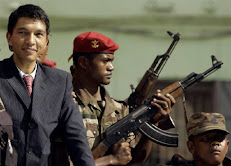Sunday, February 22, 2009
Saturday, February 21, 2009
Article 59
ICC Issues Warrant For Al-Bashir, Or Not
‘New York Times’ Reports That Arrest Warrant Was Imminent For Sudanese President Was Unfounded
Article 58
Resolution 1267 Chief Finally Addresses The Public
Published: Friday, February 13, 2009
Check out the "success" of past sanctions here:
Sunday, February 8, 2009
Editorial III
Censorship = Cowardice
You may have supported Israel during the war in Gaza, or you may have not. But I believe that anyone who supports the ostracism of those who subscribe to antagonistic viewpoints is nothing short of a coward.
The source of my outrage is this article, on Ilan Pappé. For those of you who don’t know, Pappé is known for his strong condemnation of Israeli policies in the West Bank and Gaza, and has previously supported economic and political boycotts of Israel.
Now considering I knew nothing of Pappé before reading this article, I figured it was apropos to look him up. Here were some of the criticisms I found of his work:
• "Unfortunately much of what Pappé tries to sell his readers is complete fabrication. [...] This book is awash with errors of a quantity and a quality that are not found in serious historiography. [...] The multiplicity of mistakes on each page is a product of both Pappé's historical methodology and his political proclivities[.] [...] For those enamored with subjectivity and in thrall to historical relativism, a fact is not a fact and accuracy is unattainable." – Benny Morris
• "Readers are told of events that never happened, such as the nonexistent May 1948 Tantura "massacre" or the expulsion of Arabs within twelve days of the partition resolution. They learn of political decisions that were never made, such as the Anglo-French 1912 plan for the occupation of Palestine or the contriving of 'a master plan to rid the future Jewish state of as many Palestinians as possible. And they are misinformed about military and political developments, such as the rationale for the Balfour declaration . ." – Ephraim Karsh
Let’s assume the comments of Karsh and Morris are 100% true. Let’s say Pappé is crummy historian, who fabricates events and misinforms his readers. Given this, it is still wrong to censor him, or any other academic. Censorship is the last refuge of cowards. If you take such offense to this man’s work, if you feel it is flawed to the point of hilarity as the aforementioned scholars suggest, then challenge him to a public debate and publish counter-arguments.
To label someone like Pappé an anti-Semite or self-hating Jew and deny him tenure, is really no more than a thinly veiled effort to deny him a fair fight. If you feel strongly about an issue, and are deeply bothered by critical comments, take some advice from the streets: man up! A crude message? Sure. But a valid one nonetheless.
To silence one’s voice is to be a moral and intellectual eunuch. In the end, you fuel your enemy’s fire by not engaging him.
Take a look at this debate between Norman Finkelstein and Alan Dershowitz. A paradigm for discourse? Probably not. Regardless of who you agree with however, at least Finkelstein and Dershowitz show some modicum of academic fortitude by engaging one another. Also, check out the famous Chomsky/Buckley debate from 1969.
You may have supported Israel during the war in Gaza, or you may have not. But I believe that anyone who supports the ostracism of those who subscribe to antagonistic viewpoints is nothing short of a coward.
The source of my outrage is this article, on Ilan Pappé. For those of you who don’t know, Pappé is known for his strong condemnation of Israeli policies in the West Bank and Gaza, and has previously supported economic and political boycotts of Israel.
Now considering I knew nothing of Pappé before reading this article, I figured it was apropos to look him up. Here were some of the criticisms I found of his work:
• "Unfortunately much of what Pappé tries to sell his readers is complete fabrication. [...] This book is awash with errors of a quantity and a quality that are not found in serious historiography. [...] The multiplicity of mistakes on each page is a product of both Pappé's historical methodology and his political proclivities[.] [...] For those enamored with subjectivity and in thrall to historical relativism, a fact is not a fact and accuracy is unattainable." – Benny Morris
• "Readers are told of events that never happened, such as the nonexistent May 1948 Tantura "massacre" or the expulsion of Arabs within twelve days of the partition resolution. They learn of political decisions that were never made, such as the Anglo-French 1912 plan for the occupation of Palestine or the contriving of 'a master plan to rid the future Jewish state of as many Palestinians as possible. And they are misinformed about military and political developments, such as the rationale for the Balfour declaration . ." – Ephraim Karsh
Let’s assume the comments of Karsh and Morris are 100% true. Let’s say Pappé is crummy historian, who fabricates events and misinforms his readers. Given this, it is still wrong to censor him, or any other academic. Censorship is the last refuge of cowards. If you take such offense to this man’s work, if you feel it is flawed to the point of hilarity as the aforementioned scholars suggest, then challenge him to a public debate and publish counter-arguments.
To label someone like Pappé an anti-Semite or self-hating Jew and deny him tenure, is really no more than a thinly veiled effort to deny him a fair fight. If you feel strongly about an issue, and are deeply bothered by critical comments, take some advice from the streets: man up! A crude message? Sure. But a valid one nonetheless.
To silence one’s voice is to be a moral and intellectual eunuch. In the end, you fuel your enemy’s fire by not engaging him.
Take a look at this debate between Norman Finkelstein and Alan Dershowitz. A paradigm for discourse? Probably not. Regardless of who you agree with however, at least Finkelstein and Dershowitz show some modicum of academic fortitude by engaging one another. Also, check out the famous Chomsky/Buckley debate from 1969.
Editorial II
Blood Phone
In 2006 Warner Bros. released Blood Diamond, an expose of the bloodshed and violence that lay behind the illicit diamond trade around the world. In an effort to avoid spoilers, I’ll merely say that the film takes place during the Sierra Leone Civil War, which lasted from 1991 to 2002. Control of the West African nation’s diamond trade was the major precipitant of the war, leading to a regional conflagration that included Liberia, the United Kingdom, and an array of splinter paramilitary groups.
The conflict that left 100,000 dead by some estimates, and nearly two million displaced, resulted in the Kimberly Process Certification Scheme, ratified by the UN.
The KPCS has been quite successful in accomplishing its mandate: the eradication of diamonds that have emanated from conflict zones, thus reducing the likelihood that war and exploitation will be financed by conflict diamonds. The idea that one’s wedding ring had blood on it ultimately prompted the international community to act.
But how would people react if the Motorola cell phone they were speaking on was covered in that very same blood? What about the Finding Nemo DVD you just saw with your kids? Or the desktop they just wrote up their homework on?
Many would dismiss this as hyperbole, another form of liberal knee-jerk guilt felt for factors beyond our control.
As we speak, a war of catastrophic proportions has reached its crescendo in the Democratic Republic of Congo (DRC). While the causes are myriad, prominent among them are coltan and cassiterite. Though the conflict’s origins lay elsewhere, these two minerals act as catalysts. Demand for electronic goods, many of which are comprised of coltan and cassiterite, is capitalized by militias who finance their operations by plundering these natural resources, and in the process unleashing incomprehensible violence on nearby villagers.
Also, check out this phenomenal piece on Western demand for electronics and their subsequent effect on the conflict in the DRC.
In 2006 Warner Bros. released Blood Diamond, an expose of the bloodshed and violence that lay behind the illicit diamond trade around the world. In an effort to avoid spoilers, I’ll merely say that the film takes place during the Sierra Leone Civil War, which lasted from 1991 to 2002. Control of the West African nation’s diamond trade was the major precipitant of the war, leading to a regional conflagration that included Liberia, the United Kingdom, and an array of splinter paramilitary groups.
The conflict that left 100,000 dead by some estimates, and nearly two million displaced, resulted in the Kimberly Process Certification Scheme, ratified by the UN.
The KPCS has been quite successful in accomplishing its mandate: the eradication of diamonds that have emanated from conflict zones, thus reducing the likelihood that war and exploitation will be financed by conflict diamonds. The idea that one’s wedding ring had blood on it ultimately prompted the international community to act.
But how would people react if the Motorola cell phone they were speaking on was covered in that very same blood? What about the Finding Nemo DVD you just saw with your kids? Or the desktop they just wrote up their homework on?
Many would dismiss this as hyperbole, another form of liberal knee-jerk guilt felt for factors beyond our control.
As we speak, a war of catastrophic proportions has reached its crescendo in the Democratic Republic of Congo (DRC). While the causes are myriad, prominent among them are coltan and cassiterite. Though the conflict’s origins lay elsewhere, these two minerals act as catalysts. Demand for electronic goods, many of which are comprised of coltan and cassiterite, is capitalized by militias who finance their operations by plundering these natural resources, and in the process unleashing incomprehensible violence on nearby villagers.
Also, check out this phenomenal piece on Western demand for electronics and their subsequent effect on the conflict in the DRC.
Article 54
Sudan's Threats Buttressed By China
Friday, February 06, 2009*Correction: Even though arms are brought into Sudan, China argues that they are allowed to bring them into Khartoum, just not Darfur.
Original: Even though arms are brought into Sudan, China argues that they are allowed to bring them into Darfur, just not Khartoum.
Subscribe to:
Posts (Atom)










































